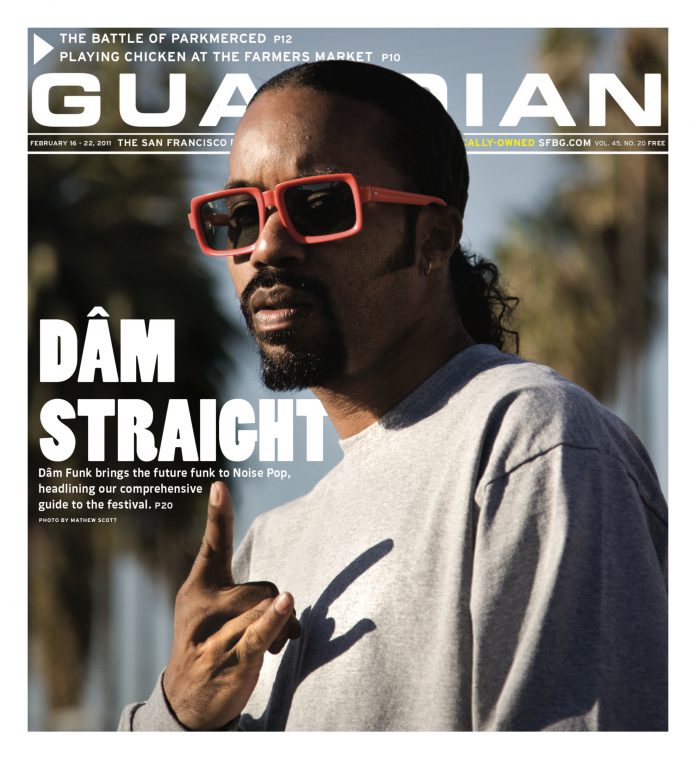caitlin@sfbg.com
LIT Benjamin Bac Sierra, San Francisco City College English composition and literature professor and author of Barrio Bushido, an ode to Mission District vato locos, picks me up in his cherry red-and-black 1972 Chevy Monte Carlo low rider. As an academic who started selling weed in the Army Street projects when he was 10, Bac Sierra is well aware that he has an attention-getting car. As it turns out, it nicely represents his world view.
“I’m not supposed to be driving a Monte Carlo. I’m not supposed to be talking to you like this,” he tells me, his conversation inflected with casual swear words and a rhythm like that of an evangelist preacher, or maybe just a man who feels what comes out of his mouth. “A lot of people go into education and think they have to choose: am I going to be square or am I going to be how I used to be? But you can be intellectual and homeboy-homegirl at the same time.”
Barrio Bushido, Bac Sierra’s first novel, follows the story of three young men who ricochet from romance to brutal gang beatings, PCP leños, larceny, and neglect. Lobo, Santo, and Toro’s world has made them wild gangsters. Author Maxine Hong Kingston has compared Bac Sierra’s prose to that other chronicler of the underground man in uncertain times, Dostoyevsky. Although it hardly glorifies the protagonists, an honor and a beautiful-crazy logic to their deeds does emerge. Bac Sierra holds that the impulsiveness, that locura, needn’t be forgotten when someone leaves the street hustling lifestyle.
“I want to make a line between being a homeboy and the negativity. Craziness is a power — you can’t learn that in a book,” he reflects. We drive by his brother’s old house on Treat and 21st streets — Bac Sierra hears that a PayPal executive lives there now. After Bac Sierra’s father died, his brother, charismatic and clever, brought him up — until his brother wound up in jail and died young.
When Bac Sierra was 17, years after he had dropped out high school and begun dealing angel dust, he had a choice. He could continue his lifestyle, possibly ending up dead or in jail, or “retreat” into the Marines, which represented an honorable discharge, as it were, from the barrio.
Bac Sierra’s experience in the Marines followed the same lines as Toro’s, his headstrong and loyal Barrio Bushido character — to a point. Both of them cleaned up and were promoted to squad leader because of their sheer “craziness.” And both saw serious front line action during the Gulf War. Bac Sierra manned a machine gun as part of the first wave of Marines to land in Kuwait City in 1991. He also began writing in the military, letters home that he would revise “maybe 10 times — I wanted to be heard.” Although he doesn’t specifically recommend military service to young people, he recognizes the value of the discipline learned in the armed forces. “A lot of homeboys don’t do shit,” he says flatly.
After serving, he retained his strong ties to the Mission and his family there. Before his brother died, he was the one who motivated Bac Sierra to get his college degree, not to stop at his master’s in creative writing from UC Berkeley, but to continue on to law school. “Hood logic,” Bac Sierra calls it, the idea that a degree in a concrete field was far better than one writing. Although he hated every day of law school, he can now appreciate the experience and the knowledge it brought him.
He pulls the Monte Carlo over to speak with an older man on the corner across the street from his brother’s old house. “Yo escribí un libro, señor, en honor de mi hermano,” he calls out the window, inviting the man to his upcoming book release party at Mission Cultural Center. Many of his friends from the old neighborhood (he now lives in Richmond, where he is raising two of his four children, Margarita, nine, and Benny, six) are Barrio Bushido‘s biggest supporters. I ask him if it makes him sad, how much the neighborhood has changed since when he grew up. “This is the world. Economics knows no friends.”
I recognize the last line from Barrio Bushido. Its characters speak with an urgent poetry, moving through scenes influenced by Dostoyevsky and Miguel Ángel Asturias, with Gabriel Garcia Márquez-like magical realism. Bac Sierra wants the book to be taught in schools and has set a goal of having it adopted into 50 class sections by next semester.
Other things he hopes for: first, that readers be taken on a journey. “It doesn’t have to be stuffy. I want them to be amazed with the language.” Second, he wants the book to show that life is full of choices. “Start living here in this world,” as he puts it.
His last hope is for a “homeboy resurgence” in the Mission, the neighborhood that was once the center of Latino culture in Northern California. Thursday’s party at the Mission Cultural Center is a start. Bac Sierra is planning a low-rider show, Aztec dancers, a reading, and live music for the event — the positive parts of homeboy culture, like Bac Sierra himself. “I’m fucking straight homeboy,” he says. “I am very efficient. I am always inventing things.”
BARRIO BUSHIDO BOOK PARTY
Thurs/17 7 p.m., free
Mission Cultural Center for Latino Arts
2868 Mission, SF
(415) 643-5001

